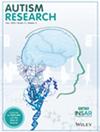Untangling the Molecular Mechanisms Contributing to Autism Spectrum Disorder Using Stem Cells
Abstract
Autism spectrum disorder (ASD) is a complex neuro developmental condition characterized by significant genetic and phenotypic variability, making diagnosis and treatment challenging. The heterogeneity of ASD-associated genetic variants and the absence of clear causal factors in many cases complicate personalized care. Traditional models, such as postmortem brain tissue and animal studies, have provided valuable insights but are limited in capturing the dynamic processes and human-specific aspects of ASD pathology. Recent advances in human induced pluripotent stem cell (iPSC) technology have transformed ASD research by enabling the generation of patient-derived neural cells in both two-dimensional cultures and three-dimensional brain organoid models. These models retain the donor's genetic background, allowing researchers to investigate disease-specific cellular and molecular mechanisms while identifying potential therapeutic targets tailored to individual patients. This commentary highlights how stem cell-based approaches are advancing our understanding of ASD and paving the way for more personalized diagnostic and therapeutic strategies.

 求助内容:
求助内容: 应助结果提醒方式:
应助结果提醒方式:


